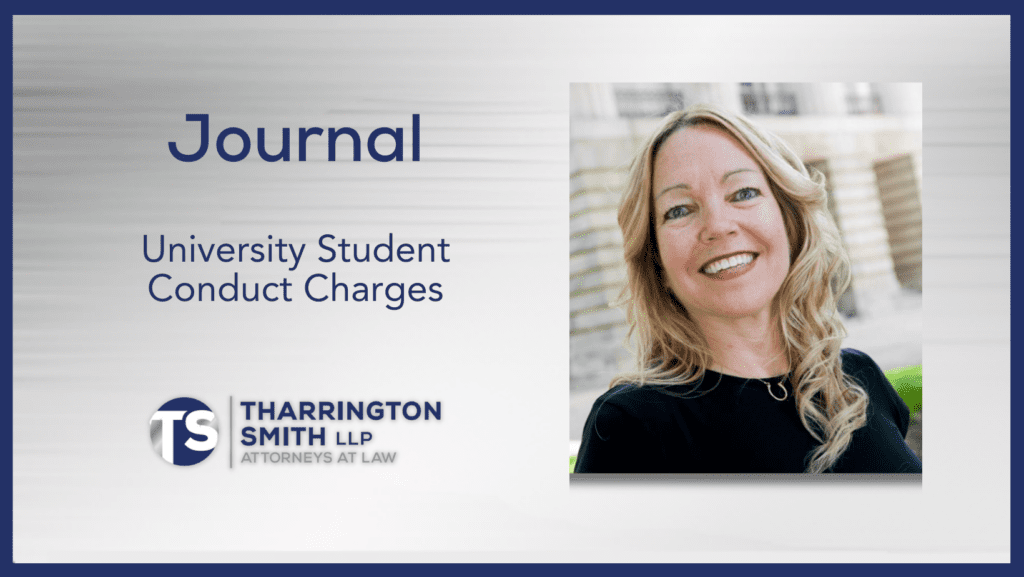If your University believes you have engaged in sexual assault or harassment, dating violence, hazing, criminal or unsafe behavior on campus, or academic misconduct, it may initiate an investigation under its Student Conduct policy, or under Title IX of the Civil Rights Act of 1964. Your first notice that you are being investigated will often come in an e-mail from your University’s Office of Student Conduct or a knock at your door and a request that you meet with a University representative. Most Universities have Offices of Student Conduct, or Offices of Institutional Equity and Diversity, and the like, that investigate and prosecute these matters. Student Conduct investigations are entirely separate from other civil or criminal investigations arising out of the same conduct, and they may proceed simultaneously.
When you meet with a University representative, your first instinct may be to speak your mind and set the record straight. You may be asked to answer questions about the alleged incident. In most cases, you are entitled to consult an attorney and have an attorney present with you at all stages. You should know your legal rights before meeting with a representative of your University. Things will happen quickly, and your continued academic (and vocational) career may be impacted severely. If you refuse to meet with a University representative or answer their questions, this can also have a negative impact.
In some cases, an interim suspension (that is, a temporary but immediate suspension) may be imposed if the University believes you pose a danger to any person or risk of disruption to University functions. If an interim suspension is imposed, you have a right to an almost immediate meeting with a University representative to challenge it. You will need to make decisions quickly about how and whether to present your case at this interim suspension hearing. You may be asked detailed questions about what occurred. Whether or not an interim suspension is imposed, the matter will then often proceed to an investigatory phase, in which a complete, lengthy investigative report will be prepared after the University has interviewed anyone it believes has relevant information. If the case is not resolved along the way, it will often proceed to a hearing.
In cases of non-academic misconduct, you are entitled to have an attorney present with you at all proceedings. You are entitled to have your matter handled in a timely fashion; to cross-examine your accuser; and to have your attorney present arguments and evidence on your behalf. You are entitled to review all evidence the University has accumulated against you, such as witness statements and other things in your University case file, prior to the hearing. But the file is often only made available to you “upon request.” In some cases, you will eventually be required to appear at a hearing before a Student Conduct Board or an Administrator (the “Hearing Officer.”)
Detailed work in preparing your testimony and your evidence for the student conduct hearing is crucial. In these hearings, at most Universities, the standard of proof is much lower than in a criminal case. At most universities, the fact finder may find you responsible based on proof by a preponderance of the evidence, or by 51%— in other words, if they believe it is more likely than not that the allegations are true. The United States Department of Education, through its Office for Civil Rights, issues rules that must be followed by Universities with respect to these proceedings, and they are less favorable to the accused, by far than the rules of procedure in a criminal case.
In some cases, an informal resolution is possible, and this is almost always a highly desirable outcome. If an informal resolution is agreeable to you (the “Respondent”) and the complaining party (the “Complainant”), the matter can be taken off the disciplinary track and resolved by means of a private agreement that won’t affect your academic record. If you are found responsible after a hearing, any serious sanction will be noted on your transcript forever. You may be sanctioned with probation, suspension, or expulsion from the University. Other more minor sanctions are often available as well. There will be a record of the outcome in the Student Conduct file at your University, which you may be asked to provide later when seeking employment or applying to graduate schools. Your ability to appeal a decision by a Student Conduct Board or Administrator after a hearing is severely limited, so you should present your best case and all of your evidence at the hearing.
We represent students in Student Conduct proceedings throughout the State. Each University has slightly different rules. These matters are won with careful attention to detail and presentation of evidence to support your version of the events; or by negotiating a resolution that will allow you to continue your studies without a negative notation on your transcript for student misconduct. We have represented students in all types of Student Conduct cases with tremendous success. If you are facing a Student Conduct investigation, we would love to help and guide you through this process.
By: Melissa Hill, Criminal Defense, Tharrington Smith, LLP
May 18, 2022

